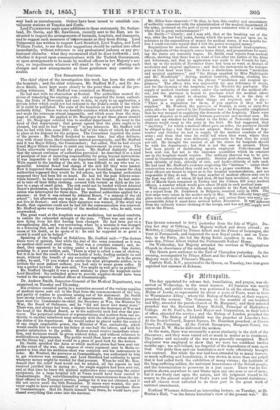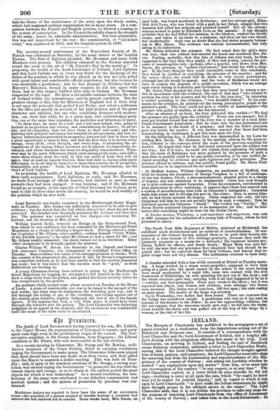tDr 311rtro3ulis.
The day appointed for solemn fast, humiliation, and prayer, was ob- served on Wednesday, in the usual manner. All business was nearly suspended, and public worship was performed in all the churches. The House of Lords, as represented by about a score of Peers, went in form. to Westminster Abbey ; where the Bishop of Salisbury, at their request, preached the sermon. The Commons, to the number of one hundred and fifty, attended the parish-church of St. Margaret ; and their selected preacher was the Reverend Henry Melvin, Principal of Haileybury College. At St. Paul's, the Lord Mayor and Corporation, in their robes of office, attended the service; the Bishop of London preached the sermon. The Bishop of Licfield was the preacher at Lincoln's Inn. At the Scotch Church, Regent Square, Dr. Hamilton preached ; at Crown Court, Dr. Cumming. At the Jewish Synagogue, Margaret Street, the Reverend D. W. Marks delivered the sermon.
In the main, there was necessarily a great similarity in the drift of the discourses ; and they were varied not so much in matter as in treatment. The justice and necessity of the war were generally recognized. Much eloquence was employed to show that we were too confident twelve months ago ; too self-reliant, too forgetful of the dependence of man upon God. Our pride then and our humiliation now were effectively brought into contrast. But while the war had been attended by so many horrors, so much suffering and humiliation, it was shown in more than one pulpit that it had called forth the exhibition of many virtues; the fortitude of the long-suffering soldier, the universal benevolence of the British people, and the determination to persevere in a just cause. There was no dis- position shown anywhere to cast blame upon any one man or set of men ; but it was freely cast upon the nation, and the judgment traced to its source in the general neglect of God's laws and the general sinfulness ; . and all classes were exhorted to do their part in the great work of national amendment.
Cardinal Wiseman delivered an interesting lecture, on Tuesday, at St. Martin's Hall, "on the future historian's view of the present war." 'He laid the blame of the misfortunes of the army upon the whole nation, which had neglected military organisation for so many years. In a com- parison between the French and English services, he showed alarming to the system of conscription. In the French the middle class is the strength of the army; hence its admirable administration. But that administra- tion was net improvised for the war: the commissariat, or "intendant corps," was organized in 1843, and the hospital system in 1836.
The seventy-second anniversary of the Benevolent Society of St. Patrick was celebrated on Saturday, by the usual dinner at the London Tavern. The Earl of Eglinton presided ; Mr. foreman and many Irish Members were present The children educated by the Society marched round the room to the air of " St. Patrick's Day in the morning." In proposing the health of the Lord-Lieutenant of Ireland, Lord Eglinton said that Lord Carlisle was in every way fitted for the discharge of the duties of the position in whieh he was placed, as he was not only gifted with great talent and considerable official experience, but also because he was essentially a gentleman ; and he had pleasure in thinking that her Majesty's Ministers, though in many respects he did not agree with them, had in this respect fulfilled their duty to Ireland. Mr. Horsman responded to the toast. He drew a favourable contrast between the state of Ireland within his remembrance and its present condition. But the greatest change is this, that the Ministers of England feel it their duty to act upon the principle that guided Lord Derby, and select a nobleman for the office not merely on account of his high position and of his great character and abilities, but one who, combining firmness with modera- tion, can show that while he is a party man, and acknowledges party ties, can at the same time repudiate the acerbities and bitterness of party. "In these days, he must be a bold and a bad man indeed, who, going to Leland as its governor and viceroy, and remembering its history, its adver sity, and its calamities, does not trace them to their real cause; and who, knowing how political turbulence has retarded its advancement, and how re- ligious bitterness has prevented its prosperity, does not feel that in these days a great opportunity is open to him, and that his first duty is to devote every energy, every effort, every thought, and every hope, to promoting the ad- vancement of the nation, whose resources are at present too imperfectly de- veloped, and whose character has been too frequently misunderstood. What- ever may be the party differences which exist among public men—and differ- ences there always must be—still, in this one point at least they will all agree, that at least as regards Ireland, their first duty is, laying aside party differences, to do all that in them lies to make that country one of prosperity, tranquillity, and peace." Such, he knew from many conversations, are the views of Lord Carlisle.
In proposing the health of Lord Eglinton, Mr. Horsman alluded to their early acquaintance. Lord Eglinton, in reply, said Mr. Horaman, no doubt from feelings of official reserve, had omitted to state in what pursuits they had been engaged : it was hunting; and if Mr. Horsman would go as straight, in his capacity of Chiof Secretary for Ireland, as he used to ride in those days across the country, be would be well worthy of the position which he now held.
Luigi Buranelli was finally examined by the Marlborough Street Magis- trate on Tuesday. Mrs. Jeans was sufficiently recovered to be able to give evidence ; but she stated that the ball which entered her chest bas not been extracted. She detailed how Buranelli murdered Mr. Latham and then shot her. The prisoner was committed on two charges—for murdering Mr. Latham, and for shooting at Mrs. Jesnes.
William Carroll Kelly, formerly an Ensign in the Sixty-second Foot, from which he was cashiered, has been remanded by the Marlborough Street Magistrate on a charge of uttering a forged check. Having ordered a num- ber of artieles of Mr. Gibson, army-saddler —calling himself "Cyril White, of the Twelfth Lancers,"—he asked Mr. Gibson to cash a check for• 201. ; and Mr. Gibson readily consented : the check turned out to be worthless. Many other charges are to be brought against the• prisoner.
Charles William W. Bevan, late Secretary to the Deposit and General Life Assurance Company, was reexamined at Guildhall Police Office on Tuesday. More evidence was taken of his misappropriation of checks. With the consent of the prosecutors the amount of bail for Bevan's reappearance was somewhat reduced, as he had been unable to find the sureties demanded last week ; but it was stated that the sureties must be " good," as fresh -defalcations are turning up.
A young Chinaman having been ordered to prison by the Marlborough Street Magistrate for begging, he attempted to kill himself in the dock : he drew a clasp-knife from his pocket, and gashed his throat severely before he was overpowered by the gaolers.
An accident which created some alarm occurred on Tuesday at the House of Lords. A stone of considerable size was to be raised to the parapet of the new works ; but when near its destination, the fastening gave way, and it fell through the ceiling of one of the corridors, and, rolling against one of the stained glass windows, slightly disfigured the feet of one of the female figures. If the impetus had been a very little more, it would have burst through the windows into the gallery. The Lord Chancellor was delivering judgment in an appeal at the moment, and the excitement was considerable until the cause of the noise could be ascertained.



























 Previous page
Previous page